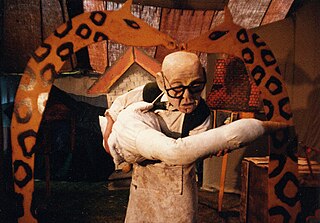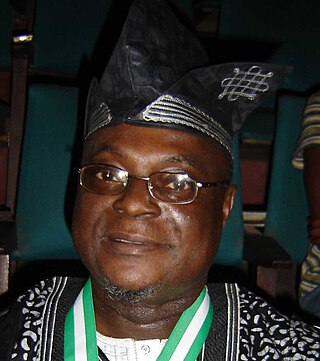
Akinwande Oluwole Babatunde Soyinka Hon. FRSL, known as Wole Soyinka, is a Nigerian playwright, novelist, poet, and essayist in the English language. He was awarded the 1986 Nobel Prize in Literature, for "in a wide cultural perspective and with poetic overtones fashioning the drama of existence", the first sub-Saharan African to be honoured in that category.

Nigerian literature may be roughly defined as the literary writing by citizens of the nation of Nigeria for Nigerian readers, addressing Nigerian issues. This encompasses writers in a number of languages, including not only English but Igbo, Urhobo, Yoruba, and in the northern part of the county Hausa and Nupe. More broadly, it includes British Nigerians, Nigerian Americans and other members of the African diaspora.

John Pepper Clark-Bekederemo was a Nigerian poet and playwright, who also published as J. P. Clark and John Pepper Clark.
Yoruba literature is the spoken and written literature of the Yoruba people, one of the largest ethno-linguistic groups in Nigeria and the rest of Africa. The Yoruba language is spoken in Nigeria, Benin, and Togo, as well as in dispersed Yoruba communities throughout the world.

Horse and Bamboo Theatre or Horse + Bamboo Theatre is a British theatre company founded in 1978 by Bob Frith. The company was known for its use of distinctive masks and visual, puppet, physical, music-based forms rather than text. Until 2018 it worked internationally as well as from its base, then known as The Boo, in Waterfoot, Rossendale, Lancashire, UK. Since 2012 the emphasis of its work has been increasingly in serving its local community, with the last touring shows taking place in 2019. In 2022 the venue was ‘de-branded’ to ‘Horse and Bamboo’.
Akinwumi Isola was a Yoruba playwright, novelist, actor, dramatist, culture activist and scholar. He was known for his writing in, and his work in promoting, the Yoruba language. As an actor, he was known for Agogo Eèwò (2002), Efunsetan Aniwura (1981) and Efunsetan Aniwura (2005).
Osonye Tess Onwueme, also known as T. Akaeke Onwueme is a Nigerian playwright, scholar and poet, who rose to prominence writing plays with themes of social justice, culture, and the environment. In 2010, she became the university Professor of Global Letters, following her exceptional service as Distinguished Professor of Cultural Diversity and English at the University of Wisconsin–Eau Claire. Through her plays, she is able to use the theatre as a medium to showcase historically silenced views such as African women, and shedding more light on African life. She sustains her advocacy for the global poor and youth, along with the experiences and concerns of the African Diaspora in her creative work. In 2007, the U.S. State Department appointed her to the Public Diplomacy Speaker Program for North, East, and West India. The 2009 Tess International Conference: Staging Women, Youth, Globalization, and Eco-Literature, which was exclusively devoted to the author's work, was successfully held by international scholars in the Nigerian capital, Abuja, following the Fonlon-Nichols award to the dramatist. She is regarded as one of the band of more important African authors. She also is an active speaker regarding domestic violence.

Babafemi Adeyemi Osofisan, known as Femi Osofisan or F.O., is a Nigerian writer noted for his critique of societal problems and his use of African traditional performances and surrealism in some of his plays. A frequent theme that his drama explore is the conflict between good and evil. He is a didactic writer whose works seek to correct his decadent society. He has written poetry under the pseudonym Okinba Launko.
Bankole Ajibabi Omotoso, also known as Kole Omotoso, was a Nigerian writer and intellectual best known for his works of fiction and in South Africa as the "Yebo Gogo man" in adverts for the telecommunications company Vodacom. His written work is known for its dedication and commitment to fusing a socio-political reappraisal of Africa and respect for human dignity into most of his works.

Carlton Lindsay Barrett, also known as Eseoghene, is a Jamaican-born poet, novelist, essayist, playwright, journalist and photographer, whose work has interacted with the Caribbean Artists Movement in the UK, the Black Arts Movement in the US, and pan-Africanism in general. Leaving Jamaica in the early 1960s, he moved to Britain, where he freelanced as a broadcaster and journalist, also travelling and living elsewhere in Europe, before deciding to relocate to West Africa. Since the latter 1960s he has been based mainly in Nigeria, of which country he became a citizen in the mid-1980s, while continuing his connection to cultural ventures in the UK and US.
Asiedu Yirenkyi was a Ghanaian playwright, actor, director, theatre company manager and author of screen plays. He was born Emmanuel Asiedu Yirenchi at Akropong-Akuapem in the Eastern Region of Ghana to Charles Okata Yirenkyi, a farmer and Comfort Yaa Nyarkoa, a homemaker. He was the younger brother of the late Ghanaian actor and film maker Rev. Kofi Yirenkyi.
Penina Muhando, also known as Penina Mlama, is a Tanzanian Kiswahili playwright, a theorist and practitioner of Theatre for Development in Tanzania.
Isidore Okpewho, NNOM, was a Nigerian novelist and critic. He won the 1976 African Arts Prize for Literature, and the 1993 Commonwealth Writers' Prize, Best Book Africa.

James Currey is a former academic publisher specialising in African Studies which since 2008 has been an imprint of Boydell & Brewer. It is named after its founder who established the company in 1984. It publishes on a full spectrum of topics—including anthropology, archaeology, history, politics, economics, development studies, gender studies, literature, theatre, film studies, and the humanities and social sciences generally—and its authors include leading names such as Bethwell Ogot and Ngũgĩ wa Thiong'o.

The 9mobile Prize for Literature was created by Etisalat Nigeria in 2013, and is the first ever pan-African prize celebrating first-time African writers of published fiction books. Awarded annually, the prize aims to serve as a platform for the discovery of new creative talent out of the continent and invariably promote the burgeoning publishing industry in Africa. The winner receives a cash prize of £15,000 in addition to a fellowship at the University of East Anglia.
Odia Ofeimun is a Nigerian poet and polemicist, the author of many volumes of poetry, books of political essays and on cultural politics, and the editor of two significant anthologies of Nigerian poetry. His work has been widely anthologized and translated and he has read and performed his poetry internationally.
Sam Omatseye is a Nigerian poet, novelist, playwright and journalist. Born on June 15, 1961, Sam Omatseye hails from Delta State, Nigeria. He is a 2019 recipient of the National Productivity Order of Merit (NPOM).
Ogaga Ifowodo is a Nigerian lawyer, scholar, poet, columnist/public commentator and human rights activist. He was awarded the 1998 PEN/Barbara Goldsmith Freedom to Write Award, given to writers "anywhere in the world who have fought courageously in the face of adversity for the right to freedom of expression.

Soji Cole is a Nigerian academic, playwright and author. He is the 2018 recipient of the Nigeria Prize for Literature. His research areas are on drama therapy, trauma studies and cross-cultural performance research.

Ossie Enekwe born Onuora Osmond Enekwechi was a Nigerian dramatist, poet, novelist, and professor of Theatre Arts. A former vice president of the Association of Nigerian Authors (ANA) as well as the former director of the Institute of African Studies at the University of Nigeria, Nsukka (1998–2004). He helped to establish the University of Nigeria's Dramatic Arts Department. Enekwe was the editor of Okike: The African Journal of New Writing from 1984 to 2010, after being appointed by its founder, Chinua Achebe, who founded it in 1971. When Ossie Enekwe retired in 2010, he handed over the editorship of Okike to Amechi Akwanya.










